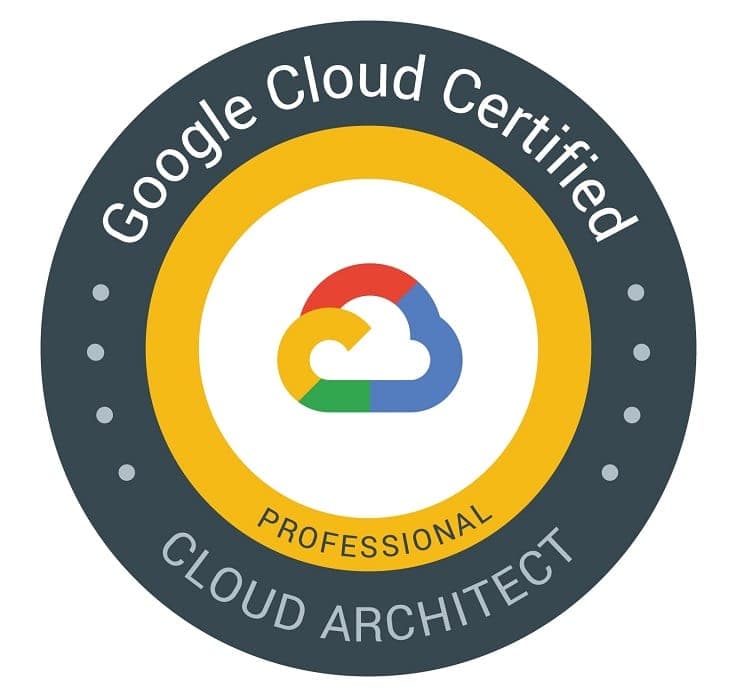Student Feedback
Professional Cloud Database Engineer Certification Video Training Course Outline
GCP Basics
Database Concepts
Google Cloud SQL
Connect to Google Cloud SQL
More Cloud SQL Features
Database on Bare Metal
Google Cloud Spanner
Google Cloud AlloyDB
Cloud Database & Firestore
Google Cloud BigTable
Google Cloud MemoryStore
Database Migration
Thank you
GCP Basics
Professional Cloud Database Engineer Certification Video Training Course Info
Google Cloud Professional Database Engineer Exam Prep & Training
Achieve Google Cloud Professional Database Engineer Certification with over 8 hours of high-definition video lessons and practical hands-on labs.
What You Will Learn From This Course
• Gain a deep understanding of database services on Google Cloud Platform
• Learn how to provision, configure, and manage SQL and NoSQL databases in GCP
• Explore Cloud SQL features including high availability, read replicas, backup, and maintenance
• Deploy horizontally scalable databases such as Cloud Spanner and AlloyDB for PostgreSQL
• Connect to Cloud SQL using Public IP, Private IP, IAM roles, and Auth Proxy
• Work with NoSQL databases including Firestore, Datastore, and Bigtable
• Utilize in-memory storage with MemoryStore for Redis and Memcached
• Perform complete database migrations using Google Cloud Database Migration Service
• Understand database architecture and design considerations for structured, semi-structured, and unstructured data
• Develop hands-on experience through over 50 practical labs and exercises
• Master techniques to store and manage terabytes to petabytes of data efficiently on GCP
• Learn about database scalability, security, and high-performance optimization in cloud environments
• Prepare for Google Cloud Professional Database Engineer Certification with comprehensive exam-aligned content
Learning Objectives
By the end of this course, you will be able to:
• Understand the core concepts of cloud databases and their application in GCP
• Deploy and manage relational databases using Cloud SQL with advanced configurations
• Configure highly available and fault-tolerant database solutions
• Implement horizontal scaling using Cloud Spanner and AlloyDB for PostgreSQL
• Utilize NoSQL database solutions for flexible schema requirements and high throughput
• Connect applications to Cloud SQL using multiple authentication and networking methods
• Monitor and optimize database performance using GCP native tools
• Implement in-memory caching solutions using MemoryStore for Redis and Memcached
• Perform database migrations from on-premises or other cloud instances to GCP
• Develop practical skills to solve real-world cloud database challenges
• Gain the confidence to appear for Google Cloud Professional Database Engineer Certification
Target Audience
This course is designed for:
• Cloud engineers, developers, and IT professionals seeking expertise in GCP databases
• Individuals preparing for Google Cloud Professional Database Engineer Certification
• Database administrators looking to transition to cloud-based database management
• Professionals interested in scalable, secure, and high-performance database solutions on GCP
• Students and technology enthusiasts seeking practical, hands-on experience in cloud databases
• Teams and organizations planning to migrate existing database infrastructure to Google Cloud
• Anyone wanting to understand the complete GCP database ecosystem, from relational to NoSQL databases
Requirements
To get the most from this course, you will need:
• A Google Cloud account with billing enabled (credit or debit card required)
• Access to a computer with a modern web browser
• Basic understanding of databases and cloud computing concepts
• Willingness to engage with hands-on labs and exercises
• Curiosity to explore different database services offered by Google Cloud
• Interest in learning practical cloud database skills applicable to enterprise environments
Prerequisites
Before starting this course, learners should have:
• Basic knowledge of cloud computing concepts including regions, zones, and virtual machines
• Familiarity with relational databases, SQL queries, and general database architecture
• Understanding of basic networking concepts such as IP addressing and authentication
• General awareness of programming or scripting to connect applications to databases
• Motivation to learn by doing through extensive hands-on labs
• Openness to work with both relational and NoSQL database systems in cloud environments
• Basic understanding of in-memory caching concepts for improved database performance
Description
Google Cloud Platform is one of the fastest-growing cloud providers globally, offering a wide range of database services for modern enterprise applications. The platform provides fully managed relational and NoSQL databases, in-memory caching solutions, and horizontally scalable distributed databases, making it suitable for everything from small-scale projects to large-scale applications serving millions of users.
Relational databases on GCP, such as Cloud SQL and AlloyDB for PostgreSQL, provide managed services with high availability, automated backups, and seamless scaling options. Cloud SQL supports popular relational engines like MySQL, PostgreSQL, and SQL Server, allowing organizations to migrate existing workloads or build new applications without managing underlying infrastructure. AlloyDB enhances PostgreSQL with features like improved performance, automatic replication, and better integration with analytics services.
For large-scale applications requiring horizontal scalability and strong consistency across regions, Cloud Spanner is the preferred solution. Cloud Spanner combines the benefits of relational database structure with global scale and high availability. It can handle terabytes to petabytes of data while maintaining ACID compliance, making it suitable for applications with high transactional requirements.
NoSQL offerings like Firestore, Datastore, and Bigtable provide flexible schema models for semi-structured or unstructured data. Firestore is ideal for real-time applications with automatic synchronization between client and server. Datastore offers a scalable NoSQL database with a flexible data model suitable for web and mobile applications. Bigtable is a wide-column NoSQL database optimized for low-latency, high-throughput workloads such as analytics and time-series data storage.
MemoryStore for Redis and Memcached provides fully managed in-memory caching services to accelerate application performance. These services can be integrated into existing applications without requiring code changes, offering a simple way to achieve sub-millisecond latency and high throughput.
Google Cloud Database Migration Service enables smooth migration from on-premises or other cloud database instances to GCP. This service supports homogeneous and heterogeneous migrations, automates schema and data transfer, and ensures minimal downtime during migration.
The hands-on labs included in this course guide learners through practical exercises like provisioning SQL and NoSQL databases, configuring replication, managing backups, connecting applications, deploying high-availability solutions, and performing database migrations. These exercises help learners gain real-world experience and develop confidence in using GCP database services effectively.
This course emphasizes learning by doing, with 80 percent practical content and 20 percent theory. Minimal slides are used, and learners spend most of their time in the Google Cloud console, interacting with actual cloud resources. This approach ensures that learners are not only prepared for certification exams but also ready to handle enterprise-level cloud database challenges.
Course Modules / Sections
This course is organized into detailed modules and sections that guide learners from foundational concepts to advanced practical applications. Each module is designed to progressively build expertise in Google Cloud Platform databases, emphasizing hands-on practice and real-world scenarios. The modules include the following:
Module 1: Introduction to Google Cloud Platform
This module covers the fundamentals of GCP, including account setup, understanding regions and zones, and navigating the Google Cloud Console. Learners will explore core GCP services, learn to manage billing accounts, and understand best practices for resource organization using projects and folders.
Module 2: Database Fundamentals
In this section, learners are introduced to essential database concepts, including structured, semi-structured, and unstructured data. Key topics such as OLTP, OLAP, RTO, RPO, and database normalization are explained. The module also introduces the types of NoSQL databases and considerations for selecting appropriate database solutions in cloud environments.
Module 3: Google Cloud SQL
This module dives into managed relational database services on GCP. Learners will provision Cloud SQL instances using MySQL, PostgreSQL, and SQL Server, connect to instances using Public IP, Private IP, IAM roles, and Auth Proxy, and explore Cloud SQL features such as high availability, read replicas, automated backups, maintenance scheduling, and monitoring.
Module 4: Google Cloud Spanner
The Cloud Spanner module covers horizontally scalable, globally distributed relational databases. Learners will configure and deploy Spanner instances, understand sharding and replication mechanisms, implement high availability, and manage schema design for large-scale transactional systems.
Module 5: Cloud Datastore and Firestore
This section focuses on NoSQL document databases. Learners will explore the differences between Datastore and Firestore, understand schema design flexibility, indexing, queries, and transactions, and implement real-world examples of applications that require scalable and low-latency NoSQL databases.
Module 6: Cloud Bigtable
Bigtable is Google’s wide-column database solution. In this module, learners will understand column family design, row key selection, hot spotting, and best practices for analytical workloads. They will deploy Bigtable instances and explore integration with other GCP services for large-scale data storage and retrieval.
Module 7: Cloud MemoryStore
Learners will work with fully managed in-memory databases like Redis and Memcached in this module. The section covers provisioning instances, connecting applications, use cases for caching, session management, and strategies for improving performance in enterprise applications.
Module 8: Database Migration
This module provides a comprehensive demonstration of database migration using Google Cloud Database Migration Service. Learners will perform homogeneous migrations, manage migration jobs, monitor replication, and understand strategies to ensure minimal downtime during migration processes.
Module 9: Security and Compliance
This section introduces database security concepts on GCP, including IAM policies, network security, encryption at rest and in transit, auditing, and compliance with regulatory standards. Learners will implement role-based access control and understand how to secure both SQL and NoSQL databases in cloud environments.
Module 10: Performance Optimization and Monitoring
This module teaches learners how to monitor, troubleshoot, and optimize database performance using GCP-native tools. Topics include query optimization, monitoring dashboards, alerting, scaling strategies, and cost optimization techniques for running databases efficiently in the cloud.
Key Topics Covered
The course covers all essential topics required to become proficient in Google Cloud database services and prepares learners for professional certification. The key topics include:
• Overview of Google Cloud Platform and core services
• Setting up GCP accounts, projects, regions, and zones
• Relational database concepts including SQL, ACID transactions, and database normalization
• Cloud SQL provisioning and configuration, high availability, replication, backup, and monitoring
• Cloud Spanner deployment, horizontal scaling, sharding, and schema design for large-scale applications
• NoSQL database concepts, schema flexibility, indexing, and query patterns
• Firestore and Datastore design, transactions, real-time updates, and use cases
• Bigtable column family design, primary key selection, hot spotting, and integration with analytics pipelines
• In-memory databases using MemoryStore for Redis and Memcached, caching strategies, and session management
• Database migration using Database Migration Service, including planning, execution, and verification
• Security and compliance in GCP databases, IAM policies, network controls, and encryption
• Performance monitoring, optimization techniques, cost management, and troubleshooting strategies
• Hands-on labs for practical experience across all database services
• Exam-focused topics aligned with Google Cloud Professional Database Engineer Certification requirements
Teaching Methodology
The course is designed with a practical, hands-on approach that emphasizes experiential learning and real-world application. The teaching methodology includes:
• Instructor-led HD video lectures to explain concepts clearly and comprehensively
• Step-by-step demonstrations in the Google Cloud Console to reinforce learning through practice
• Hands-on labs for each module that allow learners to provision, configure, and manage databases directly on GCP
• Guided exercises for SQL, NoSQL, and in-memory database implementation, including advanced features like high availability, replication, and migrations
• Case studies and real-world scenarios that illustrate practical applications of database solutions in enterprise environments
• Continuous reinforcement of key concepts with practical examples and exercises
• Minimal reliance on slides, focusing instead on direct interaction with cloud resources
• Integration of best practices for cloud architecture, security, and performance optimization
• Supportive learning environment with access to Q&A for resolving doubts and clarifying concepts
• Encouragement of learning by doing, ensuring learners gain the confidence to work independently with GCP databases
• Alignment of course content with professional certification exam objectives for structured, goal-oriented learning
The methodology ensures that learners not only understand theoretical concepts but also gain the skills needed to implement and manage cloud databases effectively. This combination of theory and practice maximizes retention, builds confidence, and equips learners to solve real-world cloud database challenges.
Assessment & Evaluation
Assessment and evaluation in the course are structured to reinforce learning and ensure mastery of all key topics. The evaluation methodology includes:
• Module-based quizzes to test understanding of concepts after each section
• Hands-on lab exercises evaluated based on successful completion and adherence to best practices
• Practical assignments involving provisioning, configuration, and management of relational and NoSQL databases
• Scenario-based exercises to assess the ability to implement high availability, replication, and performance optimization solutions
• Database migration tasks evaluated for accuracy, efficiency, and minimal downtime strategies
• Participation in Q&A discussions and practical exercises to reinforce conceptual and technical knowledge
• Periodic self-assessment tasks to track progress and identify areas for improvement
• Feedback provided on lab exercises and assignments to guide learning and address gaps in knowledge
• Final assessment combining theoretical quizzes and practical lab evaluation to simulate professional exam conditions
• Continuous reinforcement of exam-related topics to ensure readiness for Google Cloud Professional Database Engineer Certification
The assessment framework ensures that learners gain both theoretical understanding and practical skills. By the end of this part of the course, learners are expected to demonstrate proficiency in GCP database fundamentals, relational and NoSQL database management, and hands-on problem-solving in real-world cloud scenarios.
This structured approach to learning, combined with extensive practical exercises, prepares learners to apply their knowledge effectively in enterprise environments while building confidence for certification exams. By integrating theory, practice, and evaluation, learners develop a complete skill set that extends beyond certification to real-world application and professional growth in cloud database engineering.
Benefits of the Course
This course provides numerous benefits to learners looking to specialize in Google Cloud databases and advance their careers in cloud computing. By the end of the course, learners will have gained practical expertise and theoretical knowledge required to work effectively with both relational and NoSQL databases in GCP.
Learners will develop a thorough understanding of Cloud SQL, Spanner, AlloyDB, Firestore, Datastore, Bigtable, and MemoryStore, including provisioning, configuration, security, performance optimization, and migration. This practical knowledge allows learners to manage large-scale data environments efficiently and handle enterprise-level workloads with confidence.
The hands-on lab approach ensures that learners gain real-world experience, enabling them to implement cloud database solutions independently. By interacting with GCP resources directly, learners build practical skills such as setting up high availability, configuring replication, managing backups, and monitoring database performance.
This course also prepares learners for the Google Cloud Professional Database Engineer Certification by aligning all modules with the exam objectives. It offers a structured learning path to ensure mastery of essential concepts while developing problem-solving skills relevant to real-world cloud projects.
Learning through practice enhances retention and builds confidence, allowing learners to apply their knowledge immediately in professional environments. Additionally, learners gain insight into advanced database concepts such as horizontal scaling, distributed architecture, in-memory caching, and migration strategies.
Completing this course equips learners with the skills to pursue career growth in cloud computing, database administration, and data engineering roles. The combination of practical expertise, exam preparation, and exposure to enterprise-scale cloud database solutions ensures that learners can contribute effectively to organizations leveraging GCP for their data needs.
Course Duration
The course is designed to provide a comprehensive learning experience over 8 hours of high-definition video lectures. These lectures are supplemented by over 50 hands-on labs and exercises to reinforce theoretical concepts through practical application.
Each module is structured to focus on specific database services and concepts, with sufficient time allocated to explore both foundational and advanced topics. Learners can progress through the course at their own pace, revisiting modules and labs as needed to ensure complete understanding.
The combination of video lectures and hands-on practice allows learners to gain significant experience in GCP database management within a condensed timeframe. The practical labs are designed to simulate real-world scenarios, ensuring that learners acquire skills that are directly applicable to professional projects.
In addition to the structured video content, learners have lifetime access to course materials and updates. This ensures they can continue learning, review key concepts, and stay up-to-date with new features and best practices in Google Cloud databases.
The course duration is optimized for a balance between theory and practice, with approximately 80 percent of the content devoted to hands-on exercises. This approach allows learners to gain practical skills while understanding the underlying principles, ensuring readiness for both professional application and certification exams.
Tools & Resources Required
To fully participate in this course and complete all labs, learners need access to specific tools and resources. The primary requirement is a Google Cloud account with billing enabled. A credit or debit card is required to set up the account, allowing learners to provision and interact with cloud resources throughout the course.
A computer with a modern web browser is essential to access the Google Cloud Console and perform all hands-on labs. Learners will also benefit from stable internet connectivity to stream HD video lectures and interact with cloud resources in real-time.
Familiarity with basic database concepts such as SQL queries, relational schema design, and NoSQL data models is helpful but not mandatory. A willingness to learn through practical exercises and experimentation is the most important prerequisite.
The course does not require advanced software installations or additional tools beyond the Google Cloud Console. All labs and exercises are performed within the GCP environment, ensuring that learners gain practical experience with fully managed cloud services without additional setup complexity.
Additional resources provided in the course include access to lab instructions, example scripts, and reference materials for each module. These resources support self-paced learning, allowing learners to replicate exercises, explore alternative configurations, and deepen their understanding of GCP database services.
By providing all necessary tools and resources within the cloud environment, learners can focus entirely on developing practical skills, understanding database concepts, and preparing for professional certification. This streamlined approach ensures an effective and efficient learning experience without the need for external software or complex configurations.
The combination of video lectures, hands-on labs, and GCP resources creates a comprehensive learning ecosystem. Learners can practice provisioning databases, implementing high availability, performing migrations, configuring security, and monitoring performance—all within the fully managed Google Cloud environment.
Completing this course equips learners with the knowledge, practical experience, and confidence needed to implement cloud database solutions, optimize performance, ensure security, and scale applications effectively. The skills gained are directly applicable to professional projects, enterprise database management, and preparation for Google Cloud Professional Database Engineer Certification.
Career Opportunities
Completing this course opens a wide range of career opportunities in cloud computing, database management, and data engineering. Google Cloud Professional Database Engineer Certification is recognized globally and demonstrates expertise in designing, deploying, and managing cloud database solutions.
Professionals with this certification are well-positioned for roles such as Cloud Database Engineer, Cloud Solutions Architect, Database Administrator, Data Engineer, and Cloud Infrastructure Specialist. These positions involve designing scalable database architectures, optimizing performance, ensuring high availability, and managing secure data storage in enterprise environments.
Organizations across industries including finance, healthcare, retail, e-commerce, technology, and media rely heavily on cloud database solutions. With the growing adoption of GCP, certified professionals are in high demand for projects involving migration to the cloud, implementation of NoSQL and relational databases, in-memory caching, and distributed database management.
This course equips learners with practical skills in Cloud SQL, Spanner, AlloyDB, Firestore, Datastore, Bigtable, and MemoryStore. These skills allow professionals to implement high-performance solutions that meet the demands of modern applications handling terabytes to petabytes of data. Understanding these services also prepares individuals to optimize database costs, manage security, and monitor performance effectively.
Graduates of this course can also explore consulting and freelance opportunities. Many organizations seek certified experts to guide cloud database strategy, perform migrations, and implement best practices for high availability and disaster recovery. The practical experience gained through hands-on labs gives learners the confidence to take on challenging projects independently.
In addition, this certification can lead to leadership roles within technology teams. Certified professionals are often entrusted with designing and managing enterprise-level database infrastructures, mentoring team members, and making strategic decisions for database implementation and optimization. The combination of practical knowledge and recognized certification enhances credibility and professional growth potential.
Cloud database expertise also enables professionals to work on innovative projects such as real-time analytics, IoT data management, mobile application backends, and high-traffic web applications. Skills acquired in this course are directly applicable to building scalable and resilient architectures, supporting data-driven decision-making, and improving overall application performance.
The demand for cloud database professionals continues to rise as organizations adopt multi-cloud and hybrid cloud strategies. Google Cloud Platform, being one of the fastest-growing public cloud providers, offers numerous opportunities for certified individuals to contribute to enterprise cloud initiatives, optimize database operations, and ensure data security and compliance.
Completing this course not only enhances technical capabilities but also positions learners for competitive salaries and career advancement. The knowledge gained enables professionals to adapt to evolving cloud technologies, implement cutting-edge database solutions, and deliver measurable value to their organizations.
Conclusion
Google Cloud Platform Professional Database Engineer Certification is a valuable credential for anyone seeking to advance their career in cloud computing and database management. This course provides a comprehensive learning experience, combining theoretical knowledge with practical, hands-on labs to ensure mastery of GCP database services.
Throughout this course, learners have gained expertise in provisioning and managing relational and NoSQL databases, configuring high availability, implementing horizontal scaling, and performing migrations. They have learned to optimize performance, secure data, and leverage in-memory caching solutions for improved application efficiency.
The structured modules provide a clear path from foundational concepts to advanced cloud database skills. By working directly in the Google Cloud Console, learners have developed practical experience that prepares them for real-world scenarios and enterprise projects. This practical approach ensures that learners not only understand the concepts but can also apply them effectively in professional environments.
Completing the hands-on labs and exercises reinforces learning and builds confidence in managing complex database architectures. The course also aligns with the Google Cloud Professional Database Engineer Certification objectives, ensuring that learners are fully prepared for the exam and can demonstrate their expertise to employers.
In addition to technical knowledge, this course emphasizes best practices in security, performance optimization, monitoring, and cost management. These skills are critical for professionals responsible for managing large-scale cloud databases and delivering reliable, efficient, and secure solutions.
The benefits of this course extend beyond certification. Learners gain a deep understanding of GCP database products, practical experience, and the ability to implement solutions that meet enterprise requirements. This combination of knowledge, skills, and certification recognition enhances career prospects and positions individuals for growth in cloud computing and data engineering roles.
Enroll Today
By enrolling in this course, learners take the first major step toward mastering Google Cloud databases and achieving the highly respected Google Cloud Professional Database Engineer Certification. This course is designed to provide a comprehensive learning experience that balances both theory and extensive practical application. With lifetime access to high-quality, HD video lectures, learners can revisit concepts as often as needed, ensuring that every topic is fully understood and internalized.
The course includes over 8 hours of structured video content paired with more than 50 hands-on labs that cover every aspect of GCP database services. From provisioning Cloud SQL instances to deploying horizontally scalable Cloud Spanner and AlloyDB, learners gain the skills necessary to architect, implement, and manage enterprise-level databases on Google Cloud. NoSQL databases such as Firestore, Datastore, and Bigtable, as well as in-memory solutions like MemoryStore for Redis and Memcached, are also thoroughly covered to provide a complete understanding of cloud database management.
Participants will not only learn how to deploy and manage databases but will also acquire the knowledge required to optimize performance, implement security best practices, ensure high availability, and handle database migrations efficiently. These skills are essential for managing real-world cloud projects and addressing the challenges of modern data-intensive applications. By completing the hands-on exercises, learners develop confidence in implementing solutions that scale to handle terabytes or even petabytes of structured, semi-structured, and unstructured data.
In addition to practical skills, this course prepares learners for professional success by aligning closely with the Google Cloud Professional Database Engineer Certification objectives. Completing the course demonstrates proficiency in cloud database services and provides a recognized credential that enhances professional credibility. The Udemy Certificate of Completion validates the expertise gained and can be showcased to employers, clients, or peers to highlight mastery of cloud database technologies.
The course also provides additional learner support through a dedicated Q&A section, enabling participants to ask questions, clarify concepts, and resolve challenges encountered during labs or exercises. This interactive component ensures that learners have access to guidance when needed and reinforces the learning process.
By enrolling, learners position themselves for significant career growth. Google Cloud-certified professionals are in high demand across industries such as technology, finance, healthcare, retail, and e-commerce. The skills gained from this course open opportunities for roles such as Cloud Database Engineer, Cloud Solutions Architect, Data Engineer, Database Administrator, and Cloud Infrastructure Specialist. Certified professionals are often entrusted with managing enterprise-scale cloud database projects, optimizing database performance, and implementing strategic solutions that improve organizational efficiency.
Furthermore, completing this course equips learners with the ability to handle both current and emerging database technologies on GCP. They gain expertise in designing secure, scalable, and resilient database architectures capable of supporting modern applications with high traffic, real-time analytics, and complex transactional requirements. The combination of theoretical knowledge, practical labs, and exam-focused preparation ensures that learners are fully equipped to succeed in both certification exams and professional work environments.
Enrolling in this course also provides long-term value as GCP continues to evolve and expand its services. Learners benefit from lifetime access to course content and updates, allowing them to stay current with the latest features, tools, and best practices in Google Cloud database management. This ensures continuous growth in skills and keeps participants at the forefront of cloud technology advancements.
The structured learning path of this course ensures that learners progress from foundational concepts to advanced cloud database management techniques in a systematic and efficient manner. By the end of the course, learners will be able to design, deploy, manage, and optimize cloud databases with confidence, making them valuable assets to any organization leveraging Google Cloud Platform.
Take the next step in your cloud computing journey by enrolling today. Start building the skills, confidence, and expertise needed to become a Google Cloud Professional Database Engineer, and unlock new career opportunities, professional recognition, and the ability to deliver impactful cloud database solutions in any enterprise environment.













